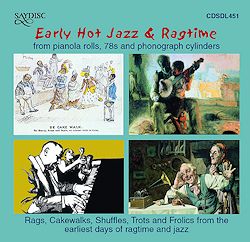 BUY NOW AmazonUK AmazonUS |
EARLY HOT JAZZ AND RAGTIME Rags, Cakewalks, Shuffles, Trots and Frolics from the earliest days of ragtime and jazz
|
Skip Along - piano roll
Pussyfoot March - James ‘Slap Rags’ White
Sunflower Dance – Vess L Ossmna (banjo)
When it’s Night Time in Italy – Casino Dance Orchestra
Maple Leaf Rag - piano roll
Whistling Rufus – Polyphon Disc Musical Box
That Moaning Saxophone Rag – Six Brown Brothers
Banjo Frolic – Fred Van Eps (banjo)
Rag-time Skedaddle - piano roll
Charleston – Savoy Orpheans
Ross Double Shuffle – E Ross (banjo)
French Trot - piano roll, played by Victor Ardey
Too Much Mustard – E Ross (banjo)
Alabama Dream – piano roll
Camptown Carnival – Olly Oakley (banjo)
Smiles and Chuckles
1915 Rag – pain roll
Mon Paris – Jay Whidden Band
Poppies – Joe Roberts (banjo)
Florida Rag - piano roll
Dardanella – Harry Raderman’s Jazz Orchestra
Come Back to Georgia – Art Hickman and his orchestra
Ragtime Oriole - piano roll
Meadowlark – Duke Yellman and his orchestra
Slippery Place Rag – Arthur Pryor’s Band
Panama Rag - piano roll
Eli Green’s Cake Walk – Cullen and Collins (banjos)
This compilation comes from the extensive Saydisc back catalogue, which reaches back as far as albums released in 1967 and as far forward as one, Rag Pickings, that dates from 2007. All the discs were transferred by the late John R T Davies though one item, the recording of the 22” disc Polyphon Music Box of c.1898 is new, and previously unreleased. The pianola rolls were ‘played’ by Rodney King on the Mickleburgh Museum pianola and recorded by Gef Lucena.
There are several different areas here; the rolls, banjo players, and bands prominent among them and Saydisc’s gleeful subtitle ‘Rags, Cakewalks, Shuffles, Trots and Frolics from the earliest days of ragtime and jazz’ covers the stylistic ground nicely. Details of the differences between the Orchestrelle player attachment, on which all this disc’s rolls were played, and sibling roll systems are succinctly explained. Maple Leaf Rag is here, though I doubt Joplin would have approved of the nifty tempo at which it has been reproduced.
Popular virtuosi of the genre are accounted for in the line-up of artists and bands. Vess L Ossman, ‘The Banjo King’, had first recorded back in 1893 but the decade younger Fred Van Eps – who greatly admired Ossman and long outlived him – was largely to supplant him, in time becoming the most popular player on the American circuit. Olly Oakley was actually James Sharpe, a British performer who developed a prodigious discography in his near three-decade recording career from 1902 to 1930. Joe Roberts is not so well-known but the two-man team of Cullen and Collins enjoyed a strong following and their version of Eli Green’s Cake Walk is a hoot.
It’s good to hear those totemic bands like Europe’s Society Orchestra, and Arthur Pryor’s Band. Is that clarinettist Edgar Campbell swirling away in the former band’s rendition of Too Much Mustard and was cornet player Cricket Smith in the mix? We also hear Harry Raderman’s Jazz Orchestra and Art Hickman’s orchestra from the years 1919-20. Duke Yellman’s band has a strong, fine trombone player in its ranks. There’s nothing especially jazzy here – it’s more rag-based – especially if one appreciates what Kid Ory was recording on the West Coast at the time, and what the New Orleans Rhythm Kings and King Oliver were very soon to record. The Jay Whidden Band’s performance of Mon Paris in 1926 shows how the rag melange persisted into the days of the dance bands.
The notes are by Brian Rust, to whose radio show I avidly listened, and whose discographies are still so valuable, and by Gef Lucena, whose continuing devotion to the Saydisc cause is so obvious. There’s much here to tempt the listener to explore the raft of recordings in all genres in Saydisc’s catalogue.
Jonathan Woolf